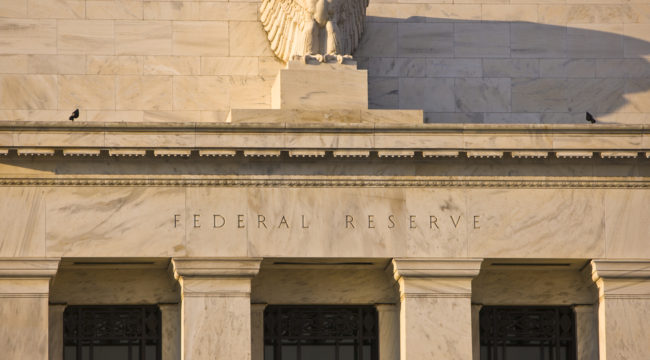Why Powell Might NOT Cut Rates
The market’s been bouncing around lately, anxiously waiting to see it the Fed cuts interest rates next week. All indications now suggest that it will. The question is by how much?
Minutes from June’s Federal Open Market Committee (FOMC) meeting that were released earlier this month indicated support for a rate cut. Certain committee officials noted that as long as uncertainty still weighed on its outlook, they would be willing to cut rates.
And during his much-awaited biannual testimony before the House Financial Services Committee, Federal Reserve Chairman Jerome Powell hinted — strongly — that a rate cut was around the corner.
Powell told the committee, “It appears that uncertainties around trade tensions and concerns about the strength of the global economy continue to weigh on the U.S. economic outlook. Inflation pressures remain muted.”
But the subsequent release of better-than-expected June employment figures complicated the matter of rate cut size and timing.
They raised the possibility that those positive jobs numbers would keep the Fed from cutting rates. After all, it doesn’t make a lot of sense to cut interest rates when the job market is so hot and unemployment is at 50-year lows.
But despite that concern, markets are still placing the odds of a rate cut of 25 basis points at 100%, with lower expectations for a 50 basis point cut.
This means a rate cut is already “baked into the cake.” However, the risk is that if Jerome Powell and the FOMC don’t cut rates next week, it could cause a sharp sell-off.
We’ll have our answer next week. But despite the overwhelming market expectations for a rate cut, I think there’s a chance the Fed won’t cut rates yet. That’s because Powell may still want to signal the Fed’s ability to act independently from White House pressure.
I realize that puts me in the extreme minority. But that’s OK, it certainly isn’t the first time.
But there’s something else going on right now that could trip up markets.
Earnings season is underway. Over the next few weeks, all of the S&P 500 companies will be rolling out their earnings figures. And more than a quarter of them will report earnings this week.
Firms from Google’s parent company, Alphabet, to Amazon, McDonald’s and Boeing are among the more than 130 companies that are reporting.
Even with a rate cut, poor corporate earnings could spell trouble for stocks. The trade war would be partly responsible. Certainly, there remains no resolution on the U.S.-China trade war front. And the trade war combined with slowing growth could amplify the effects of weak earnings.
As one article reports, “Stocks could struggle if the earnings message from corporate America focuses on the murky outlook for the economy and negative impacts from the trade wars.”
Earnings so far have been positive, but that can be misleading. That’s because second-quarter earnings expectations were kept low so that corporations could easily beat them.
Their actual earnings may not be underwhelming. But if they beat expectations, that’s all that counts.
And as I learned on Wall Street, corporations often talk down their earnings estimates in order to set a low bar. That way they can easily beat the forecast, which produces a jump in the stock price.
As Ed Keon, chief investment strategist at QMA explains:
No matter what the economic circumstances are, no matter what the backdrop is, there’s this dynamic that companies like to lowball and analysts like to give them headroom. The fact that numbers are coming in better than expected — it’s been the case for decades now.
Of the 114 companies that provided second-quarter guidance as of last week, 77% released negative forecasts, according to FactSet.
But it’s still early and there’s a long way to go.
Most industrial companies haven’t reported earnings yet. And they could reveal extensive damage from the trade war. As CFRA investment strategist Lindsey Bell says:
As we get more industrials in the next couple of weeks, I think that will create more volatility and drive the market lower in the near term… Chemicals and metals are two areas where I expect pressure.
We’ll see. But if markets do stumble, you can expect the Fed will be ready to cut rates at its meeting in September. That means more “dark money” will be coming to support markets, even if the Fed doesn’t cut rates next week.
And that’ll keep the bull market going for a while longer. One day the music will end. The imbalances in the system are just too great.
But we’re not at that point yet, and you can expect markets to rise on additional dark money injections.
Enjoy it while you can.
Below, I show you one major factor that will continue to support stocks this year. It doesn’t have to do with the trade war or earnings. What is it? Read on.
Regards,
Nomi Prins
for The Daily Reckoning



Comments: